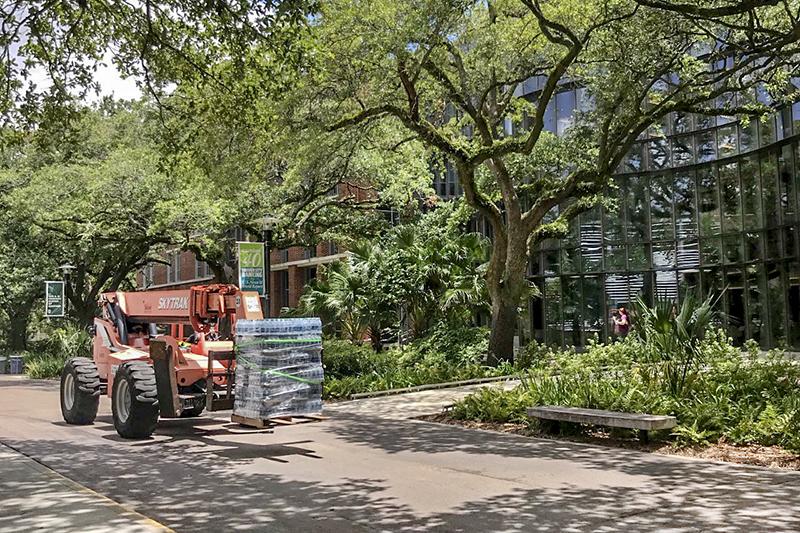Tulane was fully prepared for worst-case Barry
Hurricane Barry largely sidestepped the New Orleans area during its long, wet slog across the state, causing minimal damage to Tulane’s campuses outside of a few downed limbs and the unfortunate loss of a large oak outside of Gibson Hall.
Nonetheless, had the worst-case forecast actually happened, the university was fully prepared, thanks to the efforts of scores of Tulane personnel, from Emergency Preparedness and Response, Campus Services, Student Affairs, Tulane University Police Department, Risk Management and numerous other departments.
Efforts from these offices allowed President Mike Fitts, who stayed on campus throughout the duration of the rare, midsummer weather event, full assurance that Tulane would weather yet another storm.
“Though the number of students on campus is greatly diminished in this midsummer period and many of our faculty are away, the Tulane spirit is strong with those of us on campus. This spirit, our collective wisdom and experience will carry us safely through this event as it has so often in the past,” Fitts said in a message to the Tulane community.
“We prepare extensively for these types of weather events so we can ensure the safety and security of our community and our campuses, as well as bringing our campuses to full operations as quickly as possible,” said Randy Philipson, vice president of facilities, campus development and services.
Philipson’s department is responsible for maintaining and protecting Tulane’s physical assets during severe weather events, as well as ensuring continuity of critical operations to students, faculty and staff.
Yes, although it is July, there are plenty of students on Tulane’s campuses, including full-time students, tiny tots at Kidopolis and Newcomb Nursery, middle and high school students attending summer enrichment programs, and international students participating in Tulane Advantage, a program that helps prepare them for their academic career in a new university and new country.
“Multiple teams in Student Affairs, Campus Services, TUPD, Facilities and Dining worked to provide [services to] five buildings on campus to house summer students, summer program students and conference groups,” said Brian Johnson, assistant vice president for student affairs. “Strategic efforts in this preparation included deployment of the housing professional team, which remained in all occupied buildings through the event, distribution of food and water, security preparations, medical preparedness with on-site ambulance service, and stationing Crowd Pleasers [portable restroom trailers] outside buildings in the event of water pressure loss.”
“Our team worked around the clock coordinating with families around Barry,” said Desiree Packard, executive director of Strategic Summer Programs. “Our participants’ well-being was a top priority for all entities on campus, from Student Affairs chaperoning an outing to help them avoid cabin fever, Dining Services adjusting schedules to make sure every participant was fed, and Shuttles and Transportation taking youngsters to the airport safely and on time. It feels great to know that when our program is in need, the campus eagerly rallies to support us in every way possible.”
Forty-four international freshmen were supposed to start in Tulane Advantage on Sunday, July 14. The start date has been postponed to Tuesday, July 16.
“Staff members in the Office of International Students and Scholars (OISS) worked with Robert Connor, director of the English for Academic and Professional Purposes Program, to help those students rearrange their travel plans,” said Kristy Magner, OISS director. “A few students were already here or en route; they were settled into the residence halls on campus. We were also focused on making sure the parents of the Tulane Advantage students were aware of what was going on by translating our messages into their languages. And we were in touch with the university’s Communications and Marketing office to make sure that university messages were understandable by all of our international students and scholars. For example, making sure to explain exactly what ‘shelter in place’ means.”
Magner added, “We were also prepared to respond remotely to any immigration emergencies that may arise, such as a visa delay.”
Now that the storm has passed, staff from the Office of Case Management and Victim Services are available to assist students who may have been emotionally impacted by the storm, as well as those who may have experienced damages, at (504) 314-2160. Confidential support is available at The Line, (504) 264-6074. Students who may have a need for consideration of emergency aid should email Erica Woodley, dean of students, at ewoodley@tulane.edu.
Tulane employees needing assistance should contact the Employee Assistance Program at 1-800-622-7276 or visit https://hr.tulane.edu/benefits/employee-assistance-program.


